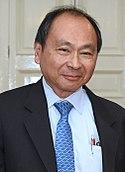Francis Fukuyama Quote
The idea that democracy was the most, or indeed the only, legitimate form of government spread to every corner of the world. Democratic constitutions were rewritten, or written for the first time, in Africa, Asia, Latin America, and the former Communist world. But stable liberal democracy was consolidated only in a subset of those countries undergoing democratic transitions, because the material balance of power in each society did not force the different actors to accept constitutional compromise. One or another actor—usually the one that had inherited executive authority—emerged as much more powerful than the others and expanded its domain at the expense of the others. The Enlightenment ideas that underpinned modern democracy were broadly disseminated across Europe, all the way to Russia. Their reception, however, differed markedly from country to country depending on how different political actors saw those ideas impinging on their own interests. Understanding the emergence of accountable government requires, then, understanding the particular political forces that existed in the different parts of Europe and why some constellations of power promoted accountability while others proved no bar to the growth of absolutism.
The idea that democracy was the most, or indeed the only, legitimate form of government spread to every corner of the world. Democratic constitutions were rewritten, or written for the first time, in Africa, Asia, Latin America, and the former Communist world. But stable liberal democracy was consolidated only in a subset of those countries undergoing democratic transitions, because the material balance of power in each society did not force the different actors to accept constitutional compromise. One or another actor—usually the one that had inherited executive authority—emerged as much more powerful than the others and expanded its domain at the expense of the others. The Enlightenment ideas that underpinned modern democracy were broadly disseminated across Europe, all the way to Russia. Their reception, however, differed markedly from country to country depending on how different political actors saw those ideas impinging on their own interests. Understanding the emergence of accountable government requires, then, understanding the particular political forces that existed in the different parts of Europe and why some constellations of power promoted accountability while others proved no bar to the growth of absolutism.
Related Quotes
People accuse me of falling in love easily. It just means that I'm able to see the beauty in most of the people who cross paths with me and I appreciate it for what it is and also for what it isn't. L...
About Francis Fukuyama
Fukuyama is best known for his book The End of History and the Last Man (1992), which argues that the worldwide spread of liberal democracies and free-market capitalism of the West and its lifestyle may signal the end point of humanity's sociocultural evolution and political struggle and become the final form of human government, an assessment met with numerous and substantial criticisms. In his subsequent book Trust: Social Virtues and Creation of Prosperity (1995), he modified his earlier position to acknowledge that culture cannot be cleanly separated from economics. Fukuyama is also associated with the rise of the neoconservative movement, from which he has since distanced himself.
Fukuyama has been a senior fellow at the Freeman Spogli Institute for International Studies since July 2010 and the Mosbacher Director of the Center on Democracy, Development and the Rule of Law at Stanford University. In August 2019, he was named director of the Ford Dorsey Master's in International Policy at Stanford.
Before that, he served as a professor and director of the International Development program at the School of Advanced International Studies of Johns Hopkins University. Previously, he was Omer L. and Nancy Hirst Professor of Public Policy at the School of Public Policy at George Mason University.
He is a council member of the International Forum for Democratic Studies founded by the National Endowment for Democracy and was a member of the Political Science Department of the RAND Corporation. He is also one of the 25 leading figures on the Information and Democracy Commission launched by Reporters Without Borders. In 2024 he received the Riggs Award for Lifetime Achievement in International and Comparative Public Administration.
